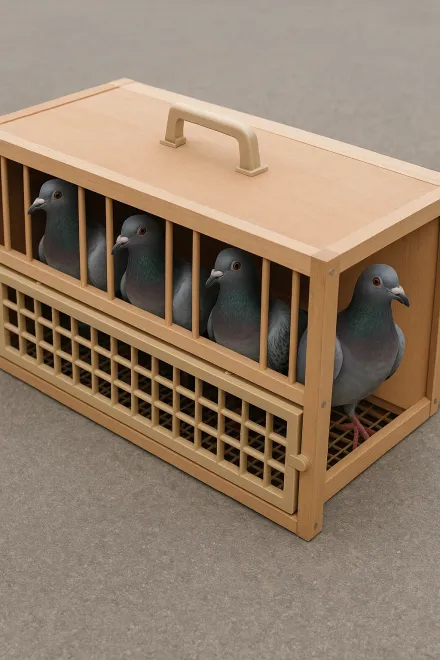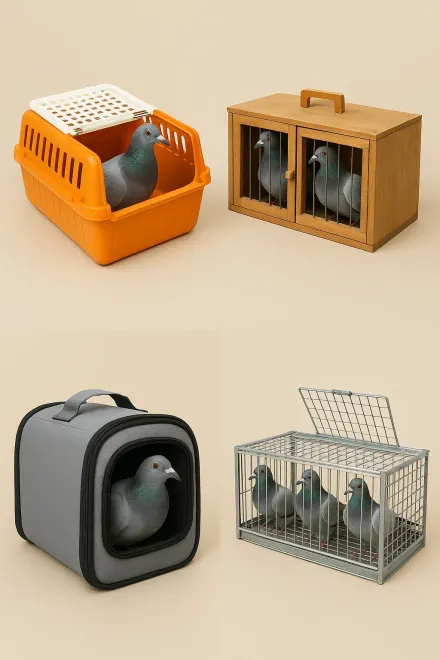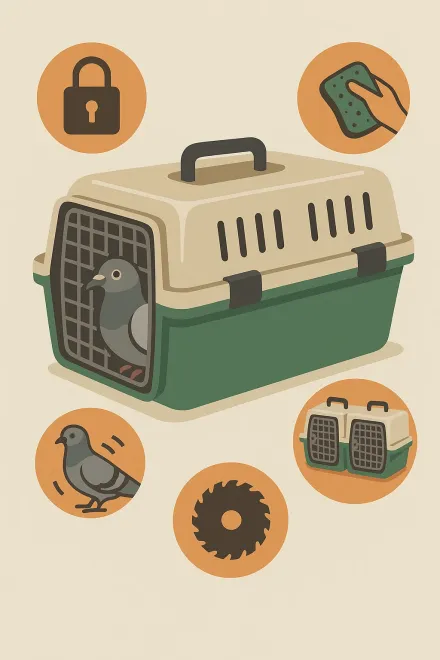Pigeon carrier
The pigeon carrier is an essential accessory for fanciers, breeders, and anyone who loves these birds. Thanks to these travel cages or boxes, pigeons can be transported safely and comfortably, whether for training, competitions, vet checkups, or simply relocating them to a new loft. Unlike generic bird carriers, those designed specifically for pigeons include features tailored to their needs, such as ventilation grids, separate compartments, and lightweight yet durable materials. Choosing the right carrier not only makes handling easier but also ensures the animal's well-being during the journey.
In this guide, you'll learn which carrier types are most used, their advantages, practical usage tips, and how to keep them in top condition. We will also include recommendations for standout models you can easily find online.
See pigeon carriers on Amazon
What is a pigeon carrier and what is it for?
A pigeon carrier is a cage or box specifically designed to transport these birds safely. These accessories are usually made from lightweight materials such as reinforced plastic or wood, and they feature ventilation grids that allow proper airflow during the trip. In many cases, carriers include individual compartments, which prevents pigeons from getting stressed or injured by being too close together.
The most frequent uses of a carrier include:
- Competitions and training: fanciers use carriers to release pigeons from different points.
- Vet visits: they make safe transport easier without the birds suffering knocks or escapes.
- Moving between lofts: in breeding setups, it is common to move pigeons from one place to another.
- Fairs or exhibitions: carriers keep the birds organized and protected.
Thanks to these features, the carrier is a practical tool that combines safety, comfort, and durability.
Types of pigeon carriers
There are different types of carriers designed to suit each breeder's or enthusiast's needs. Knowing their features will help you choose the most suitable model:
- Plastic carriers: lightweight, easy to clean, and very resistant. Ideal for frequent use.
- Wooden carriers: traditional and robust, they offer good insulation, though they tend to be heavier.
- Individual carriers: perfect for transporting a single pigeon, very useful for vet visits or specific competitions.
- Multi-bird carriers: they have compartments for several birds, keeping them separated and reducing the risk of fights.
- Foldable carriers: practical for those who want to save space when not in use.
The choice depends on factors such as how often you'll use it, how many pigeons you need to transport, and the handling comfort you want.


Advantages of using a proper pigeon carrier
Choosing a specialized pigeon carrier brings multiple benefits for both the bird and the caretaker. Some of the main advantages are:
- Safety: prevents escapes and reduces the risk of injuries during transport.
- Comfort: with proper ventilation, birds travel with less stress.
- Hygiene: modern materials make cleaning easier after each use.
- Organization: carriers with compartments let you transport several pigeons without mixing them.
- Durability: quality models withstand intensive use and stay in good condition for years.
In short, a good-quality carrier improves the transport experience and contributes to pigeons' overall well-being.
Tips for choosing the best pigeon carrier
When buying a pigeon carrier, it is important to consider several practical aspects that will make a real difference day to day. Here are some key tips:
- Capacity: estimate how many pigeons you need to transport regularly and choose an appropriate size. Avoid overloading.
- Material: plastic is lightweight and easy to clean, while wood is more robust and traditional. Assess which suits your use better.
- Ventilation: a good carrier must have grids or slots that ensure airflow.
- Access doors: make sure the design makes it easy to put pigeons in and take them out without risk of escape.
- Ease of cleaning: models that disassemble or include a removable tray are far more practical.
- Carrying comfort: opt for carriers with ergonomic handles or stackable design.
A useful trick is to read reviews from other breeders who have already tested the model. This way, you can learn first-hand the strengths and weaknesses before deciding.
Investing in a good carrier will not only save you trouble but also ensure your pigeons travel safely and calmly.
Care and cleaning of a pigeon carrier
Proper maintenance of the carrier is essential to ensure hygiene and durability. A clean carrier reduces the risk of disease, bad odors, and bacterial buildup. Here are some recommendations:
- Clean after each use: remove feathers, food remains, and droppings. Wash with warm water and a mild disinfectant.
- Complete drying: make sure the carrier is completely dry before storing it, avoiding moisture that favors mold.
- Periodic disinfection: carry out a deep clean from time to time, especially if you transport several birds.
- Check latches and hinges: ensure everything works correctly to prevent unexpected escapes.
- Proper storage: keep the carrier in a dry place, away from direct sun and dust.
If the carrier is made of wood, apply protective, bird-safe products so it stays in good condition longer. For plastic models, avoid abrasive products that could damage the material.
A well-kept carrier not only lasts longer but also reflects the caretaker's responsibility toward the pigeons' well-being.
Frequently asked questions about pigeon carriers
What carrier size do I need for my pigeons?
The size of the carrier will depend on how many pigeons you want to transport at once. For one or two birds, a small individual carrier is enough, while for training or competitions, multi-bird carriers with separate compartments are recommended. The most important thing is that pigeons travel with enough space to move without risking injuries or excessive stress.
Are plastic carriers better than wooden ones?
Both materials have advantages. Plastic carriers are lighter, easier to clean, and water-resistant, which makes them ideal for frequent use. Wooden carriers, on the other hand, offer greater robustness and tradition, and they are highly valued by classic breeders. The choice depends on your preferences and how often you plan to use them.
How do I prevent my pigeons from getting stressed during transport?
To reduce stress, it is important to use a carrier with good ventilation, avoid overcrowding birds, and keep a calm environment during the trip. It is also recommended to partially cover the carrier with a light cloth, which reduces visual stimuli and helps pigeons stay calmer.
Can I use a cat or dog carrier for my pigeons?
It is not recommended. Cat or dog carriers are not designed for pigeons' specific needs, they lack compartments, and they can be uncomfortable or unsafe for them. It is always better to choose a bird-specific model, as it ensures their well-being and makes handling easier.
How often should I clean the carrier?
Ideally, clean it after each use by removing organic waste and disinfecting with mild products. In addition, once a month it is advisable to carry out a deeper cleaning to eliminate bacteria and maintain hygiene. Regular cleaning extends the carrier's lifespan and protects your pigeons' health.
Are multi-bird carriers safe?
Yes, as long as they have individual compartments. These carriers allow you to transport several pigeons at once without them injuring each other. It is important not to overload the spaces and to ensure each compartment has sufficient ventilation. This way, the birds travel safely and comfortably.
Where can I buy a pigeon carrier?
Specialized carriers for pigeons can be found in pigeon-fancying stores, agricultural hardware shops, and online platforms such as Amazon. Buying online lets you compare models, read other users' reviews, and receive the product directly at home.
What accessories complement a pigeon carrier?
Useful accessories include clip-on drinkers and feeders, removable trays to make cleaning easier, protective covers to shield the carrier during transport, and disinfectant products to maintain hygiene. These add-ons improve the experience for both pigeons and the caretaker.
